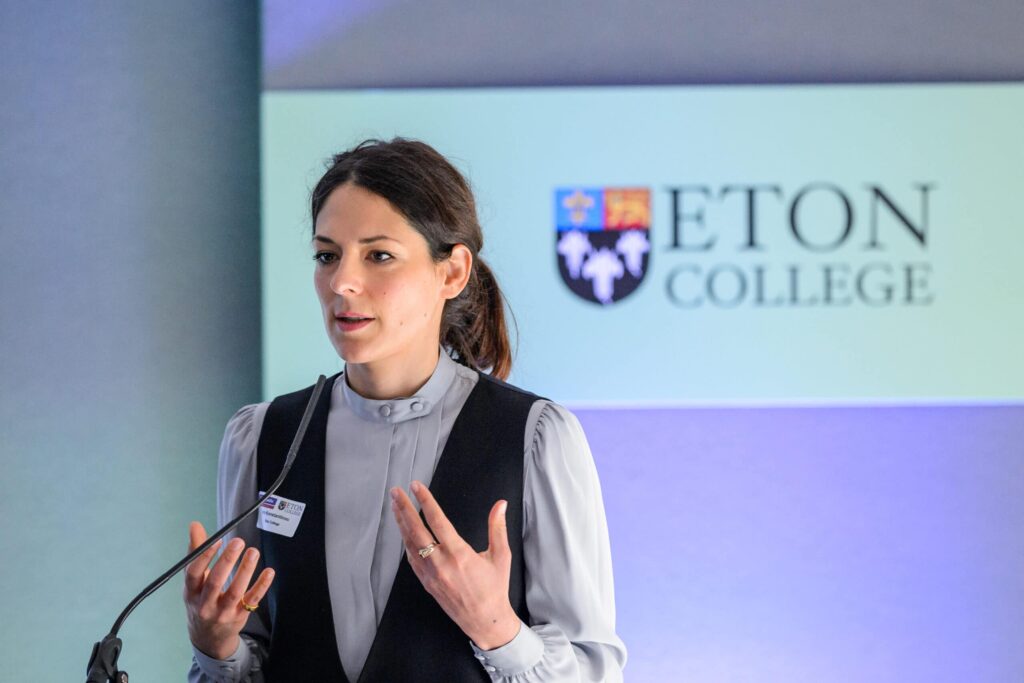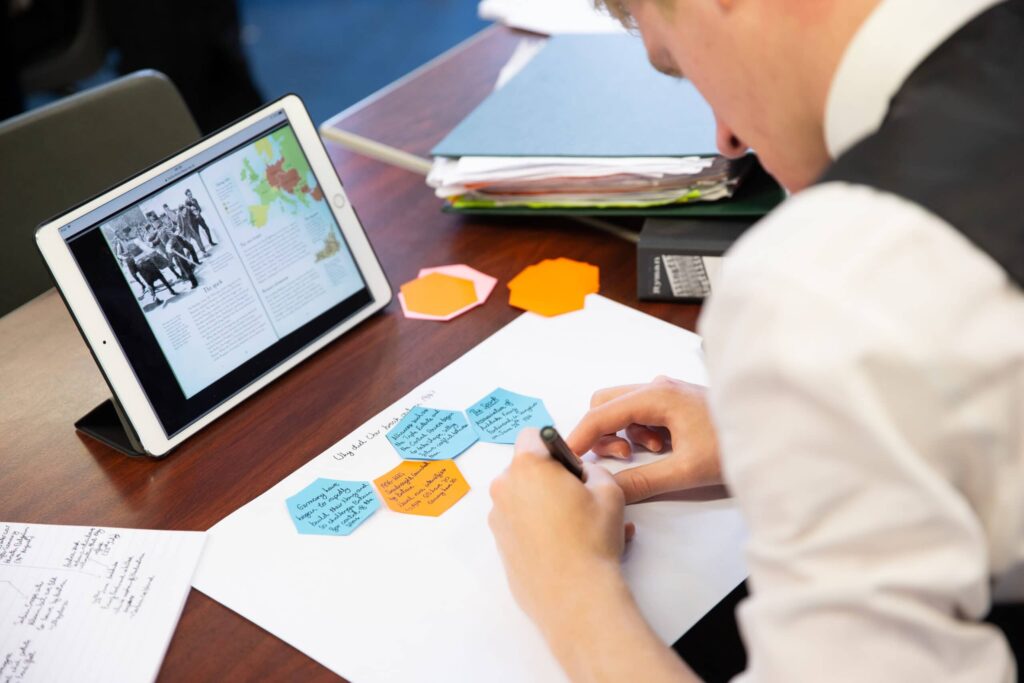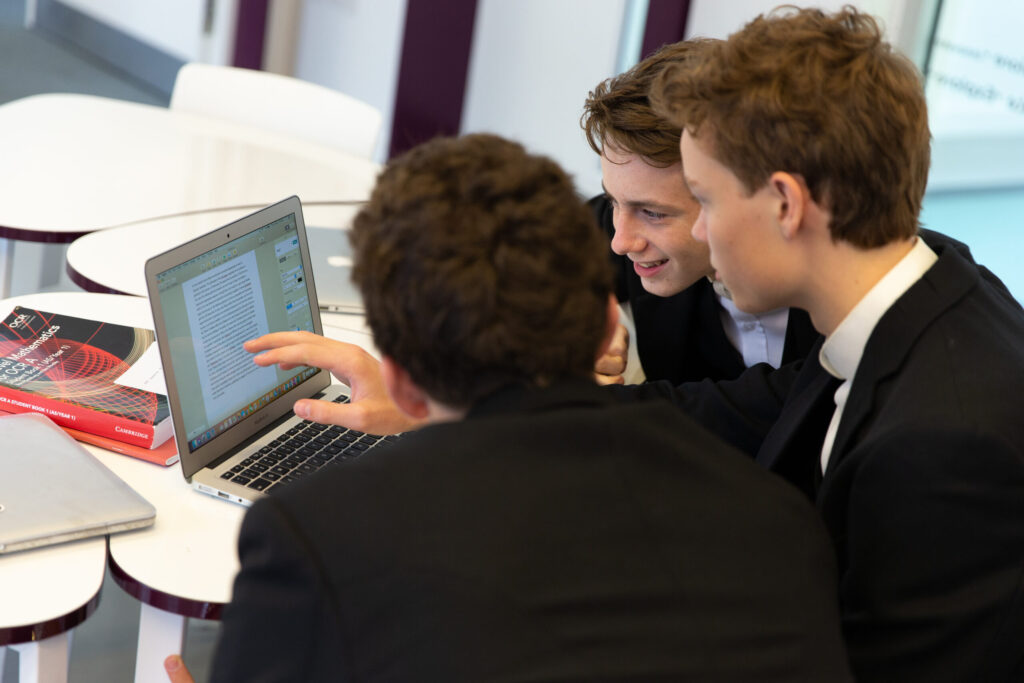Jonathan Beale, Researcher-in-Residence, CIRL
When does education happen? This was one of the thought-provoking questions Alexander Armstrong raised in his talk at the IBSC ‘Challenging Boys’ Conference at Windsor Boys’ School on Friday. Armstrong raised this question in response to a question during the discussion with the audience, about Armstrong’s claim, during his talk, that he didn’t feel he reached adulthood until his late twenties. This draws attention to the following theme in education. One of a school’s important roles is to help prepare a child for adulthood. One of the skills children develop at school in preparation for adulthood, increasingly during their final school years, is how to learn independently. What is ‘independent learning’ and why is it important to develop this skill?
Independent learning is the process whereby someone manages their own learning, rather than their learning being managed by a teacher. By ‘managing’ I do not mean the action of learning; learning, in that sense, is always independent – you cannot do your student’s learning for them. But the process of learning involves far more than the action of learning. The process involves study and revision; writing and discussion; planning and reflection; monitoring and evaluation; and, perhaps, rewards and sanctions. A teacher often manages many of these tasks, to varying degrees throughout a student’s education, with a reduction of most areas as a student moves through their education. Independent learning is where a student manages the process of learning themselves, rather than the teacher, such as the planning, monitoring and evaluation of their learning.
Independent learning should not be conflated with independent thinking. Independent thinking skills are those involved in reaching and defending one’s own, critical, informed judgements. These two types of skills can develop independently of one another.
Independent learning comes in a wide variety of degrees. As one increases the degree of independent learning throughout one’s education, from school to university and beyond, one might engage in such activities as spending increasing time working on projects with decreasing guidance; setting more self-imposed deadlines and increasingly working to one’s own schedule; sourcing and engaging in research with less guidance; learning with less instruction, if any; and self-evaluating one’s own progress.
One need not be a complete autodidact in order to be an independent learner. While studying for a PhD is mostly a process of independent learning, a doctoral student has a supervisor (or several) from whom they receive feedback on their work; and a doctoral student typically discusses their work with and presents their work to their supervisors, peers and others working in their field. All of this is integral to the learning process of graduate study.
The best society is one with well-educated citizens. This has limits; a well-functioning society would not be entirely made up of scholars or academics; and those who govern society need not remain in formal education until midlife. Plato would disagree with the final of these claims: those that would govern the just city-state he outlines in the Republic should receive an education until the age of thirty-five, followed by fifteen years of holding offices to gain life experience, before they would be ready to govern – if, that is, they excelled during those fifteen years.[1] Life experience, however, takes many forms; and it is possible to be overeducated. But we should strive to educate as many of our citizens as well as possible until at least their early adulthood, in school and then through whichever form of higher education they might choose to pursue thereafter.
Beyond the education we receive prior to and in the early stages of adulthood, while people can and should enrol onto continuing education courses, people should, more importantly, continue to educate themselves. That requires independent learning skills and draws attention to perhaps the most obvious reason why independent learning skills are important: if one is to continue learning throughout one’s life, one needs to be able to do so without relying on a teacher.
This brings us back to Armstrong’s question, ‘When does education happen?’. The answer is that education is an ongoing, accumulative process, through which we make incremental steps throughout our lives. Education has no beginning or end; it’s only circumscribed by the limits of our lifetimes. Learning not only lacks temporal limits; it’s also not limited by consciousness: studies are increasingly showing that psychological processes such as memory consolidation take place during sleep, and that sleep facilitates problem-solving. (For some tips on learning while you sleep, see here.)
We learn at an incredibly fast rate from the moment we enter the world; but we tend to think that as we get older not only do we learn less, but we should learn less. While the descriptive claim may be true, the normative claim is not. Education never ends. But for it to never end, we need the skills to educate ourselves. That requires independent learning skills, which are important to teach students to increasing degrees throughout school and university education, such that when they leave formal education, they are equipped to continue educating themselves.
This benefit of independent learning skills not only concerns the length of time one can spend educating oneself, but also the breadth of subjects in which one can educate oneself. There are many fields in which one will not have the chance to receive a formal education. Even if one has the opportunity, one might not take full advantage of it, for reasons within or outside one’s control. Equipped with independent learning skills, one can take up or re-engage with those subjects they never had the opportunity to study or didn’t take full advantage of.
Developing independent learning skills is a gradual process which takes place over many years. This is why it is sometimes difficult for students and teachers to manage the transition between key stages four and five, or for students to adjust to university life – for the process of developing independent learning skills often isn’t fast enough to keep up with the significance of the incremental steps between these levels of education in terms of the increasing levels of independent learning required.
This caveat is important for schools to take into account when, for example, placing expectations on the amount and quality of independent learning from sixth form students as they begin this final stage of school education. One cannot simply tell students to complete a certain number of hours of ‘independent learning’ outside of lessons and homework and expect this to be fruitful without some guidance as to what, exactly, they should be doing during this time and how to go about it. It’s likely to be more effective to provide students with instruction and guidance on effective methods of independent learning, such as collaborative group discussions, revision techniques, effective note-taking and effective methods of reading. This guidance should be reduced as students’ independent learning skills increase through sixth form study.
This caveat is particularly important to take into account when students take the Extended Project Qualification (‘EPQ’), which is mostly completed via independent learning. The EPQ has become a fast-growing option in schools, with over 40,000 entries in 2019. A student taking the EPQ needs to engage in extensive independent learning but at this stage of education will typically only be early in the stages of developing independent learning skills. It can be more fruitful for their engagement with the EPQ and the development of their independent learning skills to, for example, timetable, where possible, focused EPQ study sessions, with students working independently but a teacher being present to offer guidance if required. It’s also best to offer training in research skills both early in and during the process of the EPQ, on areas such as how to identify reliable sources of research, how much research is required to support an excellent research project, and how to reference sources.
While the focus of the EPQ is on students learning for themselves and managing their learning independently, greater support needs to be provided for students at this stage of education than, for example, the support undergraduates are typically given when completing final-year dissertations. In both the EPQ and an undergraduate dissertation, though, students need to take control of the learning process, an important part of which is enabling supervisors to monitor their progress easily.
An excellent model for the level of EPQ guidance appropriate to the level of independent learning skills students have typically acquired by this point in education is offered by Cranleigh School. Students taking the EPQ at Cranleigh have three timetabled lessons per week on the EPQ, at least one of which involves seeing their supervisor. Some lessons offer guidance on research skills; students are also asked to discuss their project ideas and their supervisor provides tutorial-style support. Students have access to scaffolding by means of access to exemplar projects and supporting materials on Google Classroom, such as videos (some of which are publicly available online).
None of the above should be interpreted as claiming that the best learning process is to be entirely self-taught. We need not aim towards total autodidacticism in our efforts to develop independent learning skills. The path towards gaining expertise in any field is having an excellent teacher throughout one’s learning process, as increasing research is showing. Just as top athletes receive coaching throughout their careers, so should those aiming to reach the top of their game in any field, throughout their careers. Many of the top businesspeople in the world receive professional coaching; coaching has become an area of development in education in some schools; and in recent years, there has been a steady rise of successful ‘life coaches’, offering professional guidance on the most broad possible field in which one could ever receive any kind of teaching or coaching, ‘life’.
The best learner is one with excellent skills in independent
learning; and the best education consists of expert teaching. Combine those,
and you have two essential ingredients to excellent education: well-developed
independent learning skills combined with expert training.
[1] See Plato, Republic [Politeia] (tr. B. Jowett) in The Dialogues of Plato, Vol. III (Oxford: Clarendon Press, 1892 [c.380 BCE]), Book VII.




